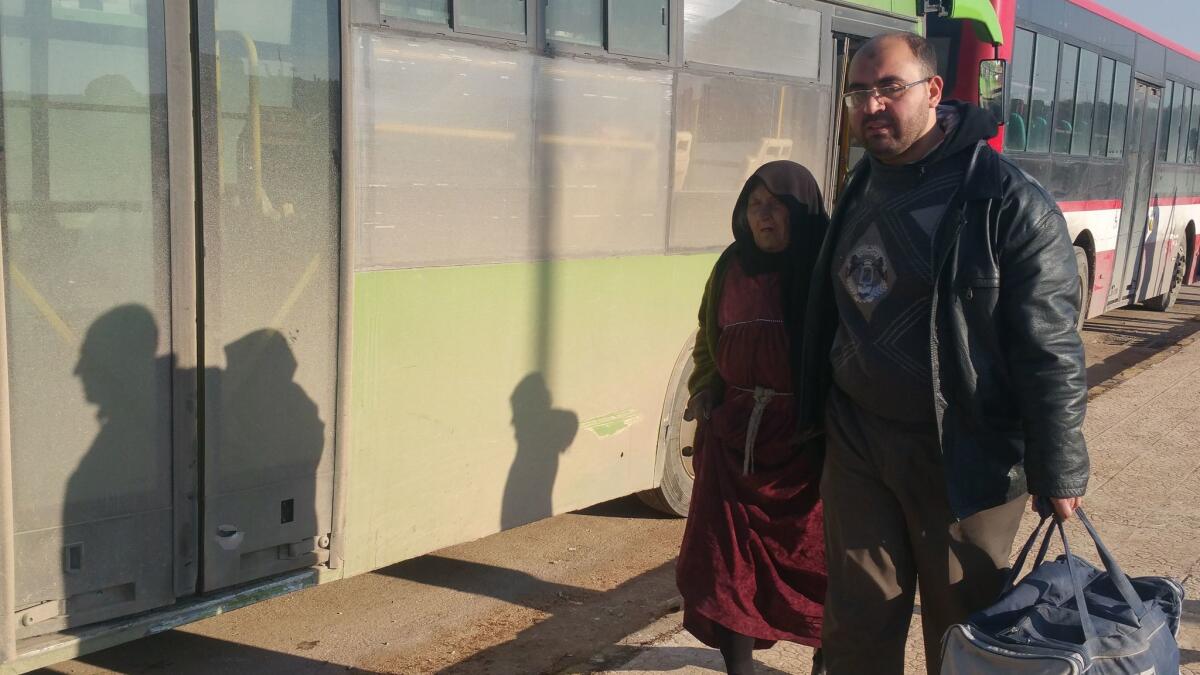A bittersweet Aleppo story: ‘Sir, do you know where I can find my mother?’

Reporting from Aleppo, Syria — Mustafa Sello strode up to the soldiers loitering by the green buses near southern Aleppo’s Ramousseh crossing, where they waited to evacuate the last residents out of the city’s eastern districts.
“Please, sir, do you know where I can find my mother? An officer told me she would be here,” Sello asked, his eyes filling with tears.
It had been more than four years since he had last seen her, since the Syrian civil war engulfed this commercial capital 16 months after anti-government uprisings began in early 2011.
Minutes later, a white van drove up. The door opened, and out stepped a frail woman dressed in a tattered purple velvet frock and olive cardigan.
Sello’s mother, 80-year old Fatemah, had arrived.
Seeing him, her face puckered in a spasm of emotion, and tears left tracks in the dirt caked in the wrinkles of her face. Sello too began to cry as he rushed to embrace her tiny frame.
Theirs was not a unique story in this almost six-year crisis, which has killed hundreds of thousands of people and displaced millions more. Its battle lines have left almost no family whole.
In Aleppo those lines were physical. The clashes between rebels and troops loyal to Syrian President Bashar Assad split the city in two.
Fatemah and her two other sons stayed in the Sakhour district, where the family house stood (“She had carried the stones to build it on her back,” said Sello). The neighborhood became part of the rebels’ bastion in eastern Aleppo.
Sello, a government employee at the Ministry of Industry, had remained in the government-held half to the west. From there, he was able to stay in touch with his family by phone. But for years, that was as close as they got.
This week, the divisions were erased as the government proclaimed that it had removed the last rebels from eastern Aleppo and was in control of the entire city, Syria’s largest. But even now, the aftershocks linger.
In late November, with its cadres battered by a months-long siege, the opposition collapsed before an unrelenting onslaught by pro-government troops. Successive rebel neighborhoods fell, including Sakhour, with as many as 100,000 people escaping towards government-held areas, according to the Syrian pro-opposition Syrian Observatory for Human Rights.
But thousands, wary of retribution or enlistment in government forces (army service is compulsory in Syria), fled deeper into those districts still in rebel hands.
Fatemeh, unable to walk on her own, was carried from her house in Sakhour to the Sukkari neighborhood.
The onslaught continued, and more of the enclave fell to government forces. Faced with certain defeat, the rebels surrendered, and negotiated their safe passage out of the city.
Their exit, which finished Thursday after days of stalling and breakdowns, took most of the estimated 35,000 residents to Idlib province, where the opposition still holds sway.
But when a soldier boarded the bus leaving Sukkari and asked if anyone wanted to stay in government areas, Fatemah raised her hand.
Once reunited with his mother, Mustafa took her to an apartment to see her grandchildren, 8-year-old Hanin and her 5-year-old brother, Tyme.
“It’s the first time she will ever see Tyme,” he said, huffing as he helped Fatemah up the four stories to his door. At the end, she could walk no more, and crawled up the final steps on hands and knees.
Hanin opened the door and quickly hugged her grandmother, but Tyme seemed wary, reluctantly stepping into Fatemah’s waiting arms.
“Why do you look like that?” he asked, running his finger down Fatemah’s dirtied nose.
She hugged him, then started to wipe the grime from her hands with wet tissues. A pile of them grew by her side.
“We slept in the street last night … on blankets and whatever mattresses they could find. I’m so tired,” she said.
She spoke of how the fighters, loath to leave behind any spoils for their loyalist foes, had disposed of whatever they could not take with them.
“They dumped bags of sugar and oil on the ground. Your brothers had new two motorcycles in the shop. They burned them as well,” she said to Sello.
Although she was happy to have left eastern Aleppo, the family’s reunion was bittersweet: Fatemah had come alone. Sello’s brothers had gone to Idlib.
“I didn’t see them when I got off the bus. … I knew they were behind me, but I couldn’t see them,” she said.
Even for families who had left the rebel enclave together, the relief they felt in leaving the siege in rebel-held Aleppo was often short-lived.
Several women interviewed last week in Jibreen, an industrial town where thousands of the displaced from east Aleppo had been given temporary shelter, said their husbands underwent ID checks by government authorities.
Those men of fighting age who had not finished their military service or had been listed as reservists were soon dispatched to training camps, leaving their families to return alone to what remained of their houses in eastern Aleppo, now under government control.
And even for those whose families had remained intact as they escaped to Idlib, there were few entirely happy endings.
“I’m happy because my daughter is getting treatment. … She was very sick inside Aleppo,” said one pro-opposition activist, who declined to give his name for reasons of privacy.
He spoke on the phone Friday from the Atmeh refugee camp on the Syrian-Turkish border, where he had taken his 2-month-old daughter Lareen to the hospital.
“But,” he said, “if we had stayed besieged it would have been better than leaving our houses and being displaced from our land.”
Bulos is a special correspondent.
More to Read
Sign up for Essential California
The most important California stories and recommendations in your inbox every morning.
You may occasionally receive promotional content from the Los Angeles Times.











